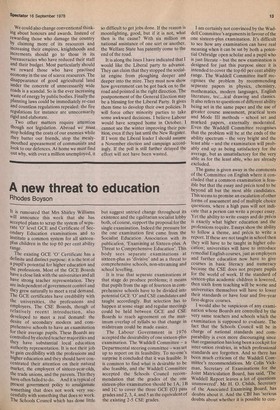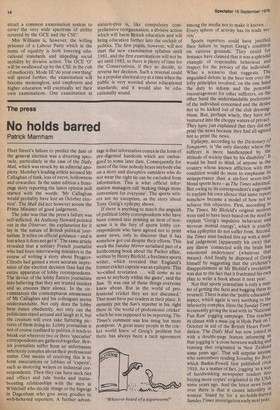A new threat to education
Rhodes Boyson
It is rumoured that Mrs Shirley Williams Wilt announce this week that she has accepted plans to scrap the system of separate '0' level GCE and Certificate of Secondary Education examinations and to institute a common system for all sixteenplus children in the top 60 per cent ability range The existing GCE '0' Certificate has a definite and distinct purpose: it is the test of a pupil's potential for higher education and the professions. Most of the GCE Boards have a close link with the universities and all have strong teacher representation. They are independent of government control and they grew naturally to meet a real demand. The GCE certificates have credibility with the universities, the professions and employers. The CSE Boards, though of relatively recent introduction, also developed to meet a real demand: the desire of secondary modern and comprehensive schools to have an examination for their average pupils. These Boards are controlled by elected teacher majorities and they have substantial local education authority representation. It is not their job to gain credibility with the professions and higher education and they should have concentrated their attention on their natural market, the employers of sixteen-year-olds, the trade unions, and the parents. This they have often failed to do. And it is typical of Present government policy to amalgamate something that does not work very successfully with something that does so work. The Schools Council which has done little but suggest untried change throughout its existence and the egalitarian socialist lobby both, of course, support the proposal for the single examination. Indeed the pressure for the one examination first came from the Socialist Education Association with its publication, 'Examining at Sixteen-plus. A Threat to Comprehensive Education'. This body sees separate examinations at sixteen-plus as 'divisive' and as a threat to comprehensive schools, non-streaming and school levelling.
It is true that separate examinations at that stage do produce problems; it means that pupils from the age of fourteen in comprehensive schools have to be divided into potential GCE '0' and CSE candidates and taught accordingly. But selection has to happen at some stage and regular meetings could be held between GCE and CSE Boards to reach agreement on the maximum overlap of syllabi so that change in midstream could be made easier.
The Labour Government in 1976 accepted the desirability of one sixteen-plus examination. The Waddell Committee — a Departmental steering committee — was set up to report on its feasibility. To no-one's surprise it concluded that it was feasible. It is common to find what is desirable to be also feasible, and the Waddell Committee accepted the Schools Council recommendation that the grades of the one sixteen-plus examination should be 1A, 1B and 1C to cover the three GCE (0) pass grades and 2, 3, 4, and 5 as the equivalent of the existing 2-5 CSE grades. I am certainly not convinced by the Waddell Committee's arguments in favour of the one sixteen-plus examination. It's difficult to see how any examination can have real meaning when it can be sat by both a potential Oxbridge open scholar and a pupil who is just literate — but the new examination is designed for just this purpose since it is intended to cover the top 60 per cent ability range. The Waddell Committee itself recognises the problem by recommending separate papers in physics, chemistry, mathematics, modern languages, English literature, tecl....ical drawing and classics. It also refers to questions of different ability being set in the same paper and the use of greater course assessment, practical tests and Mode III methods — school set and marked papers, externally moderated. Even the Waddell Committee recognises that the problem will be at the ends of the ability spectrum — the very bright and the least able — and the examination will probably end up as being satisfactory for the average, but as unsatisfactory for the very able as for the least able, who are already excluded.
The game is given away in the comments of the Committee on English where it concluded that a common examination is feasible but that the essay and précis tend to be beyond all but the most able candidates. This seems to promise an escalation of other forms of assessment and of multiple choice questions, where a high pass will not indicate that a person can write a proper essay. Yet the ability to write essays and do précis is exactly what higher education and the professions require. Essays show the ability to follow a theme, and précis to write a report. If these are not taught in school then they will have to be taught in higher education; universities will have to introduce remedial English courses, just as employers and further education now have to give courses in basic literacy and numeracy because the CSE does not prepare pupils for the world of work. If the standard of sixteen-plus academic children is lowered, then sixth form teaching will be worse and universities themselves will have to lower their standards or have four and five-year first-degree courses.
I.would also be suspicious of any examination whose Boards are controlled by the very same teachers and schools which the examination is supposed to evaluate. The fact that the Schools Council will be in charge of national standards and comparability is even more discouraging since that organisation has long been a cockpit for inter-union rivalries, in which professional standards are forgotten. And so there has been much criticism of the Waddell Committee's recommendations. Mr Colin Vickman, Secretary of Examinations for the Joint Matriculation Board, has said, The Waddell Report leaves a lot of questions unanswered'. Mr H. 0. Childs, Secretary of the Associated Examining Board, has doubts about it. And the CBI has 'serious doubts about whether it is possible to con struct a common examination system to cover the very wide spectrum of ability covered by the GCE and the CSE'.
Mrs Williams is, however, the Willing prisoner of a Labour Party which in the name of equality is both lowering educational standards and impeding social mobility by divisive action. The GCE '0' will be swallowed up by the CSE in the cult of mediocrity. Mode III `do your own thing' will spread further, the examination will become meaningless, and employers and higher education will eventually set their own examinations. One examination at sixteen-plus is, like compulsory comprehensive reorganisation, a divisive action which will harm British education and will bring education further into the cockpit of politics. The first pupils, however, will not start the new examination syllabus until 1981, and the first examinations will not be set until 1983, so there is plenty of time for the Conservatives, if they so decide, to reverse her decision. Such a reversal could be a popular electoral cry at a time when the public is very worried about educational standards; and it would also be educationally sound.



































 Previous page
Previous page